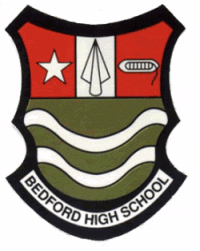Related Research Articles

Allan Glen's School was, for most of its existence, a local authority, selective secondary school for boys in Glasgow, Scotland, charging nominal fees for tuition.

Accrington Academy is a mixed 11-18 Academy in Accrington, Lancashire. It has designated specialisms in Sports and Mathematics. It is situated in the centre of Accrington. Accrington St Christopher's C of E High is nearby to the west.

Bedford High School is a school for boys and girls in the Bedford area of Leigh, Greater Manchester, England.

The Royal Institution of Australia (RiAus) is a national scientific not-for-profit organisation with a mission to "bring science to people and people to science". It opened in October 2009.
The New Year Honours 1989 were appointments by most of the Commonwealth realms of Queen Elizabeth II to various orders and honours to reward and highlight good works by citizens of those countries, and honorary ones to citizens of other countries. They were announced on 31 December 1988 to celebrate the year passed and mark the beginning of 1989 in the United Kingdom, Australia, New Zealand, Mauritius, the Bahamas, Grenada, Papua New Guinea, the Solomon Islands, Saint Vincent and The Grenadines, Belize, Antigua and Barbuda, and Saint Christopher and Nevis.
The New Year Honours were appointments by King George V to various orders and honours to reward and highlight good works by citizens of the United Kingdom and British Empire. They were announced on 31 December 1926.
The New Year Honours 1963 were appointments in many of the Commonwealth realms of Queen Elizabeth II to various orders and honours to reward and highlight good works by citizens of those countries. They were announced in supplements to The London Gazette of 28 December 1962 to celebrate the year passed and mark the beginning of 1963.
The New Year Honours 1966 were appointments in many of the Commonwealth realms of Queen Elizabeth II to various orders and honours to reward and highlight good works by citizens of those countries. They were announced in supplements to the London Gazette of 31 December 1965 to celebrate the year passed and mark the beginning of 1966. At this time honours for Australians were awarded both in the United Kingdom honours, on the advice of the premiers of Australian states, and also in a separate Australia honours list.
The Queen's Birthday Honours 1954 were appointments in many of the Commonwealth realms of Queen Elizabeth II to various orders and honours to reward and highlight good works by citizens of those countries. The appointments were made to celebrate the official birthday of The Queen.
The King's Birthday Honours 1950 were appointments in many of the Commonwealth realms of King George VI to various orders and honours to reward and highlight good works by citizens of those countries. The appointments were made to celebrate the official birthday of the King, and were published in supplements to the London Gazette of 2 June 1950 for the British Empire, Australia, Ceylon and New Zealand.
The 1948 New Year Honours were appointments by many of the Commonwealth realms of King George VI to various orders and honours to reward and highlight good works by citizens of those countries. They were announced on 1 January 1948 for the British Empire and New Zealand to celebrate the past year and mark the beginning of 1948. By coincidence it coincided with the nationalization of the Big Four railways into what is now known as British Railways.
The 1945 New Year Honours were appointments by many of the Commonwealth realms of King George VI to various orders and honours to reward and highlight good works by citizens of those countries. They were announced on 1 January 1945 for the British Empire, Canada, and the Union of South Africa to celebrate the past year and mark the beginning of 1945.
The New Year Honours 1922 were appointments by King George V to various orders and honours to reward and highlight good works by members of the British Empire. They were published on 30 December 1921.
The Honours Committee is a committee within the Cabinet Office of the Government of the United Kingdom formed to review nominations for national honours for merit, exceptional achievement or service. Twice yearly the Honours Committee submits formal recommendations for the British monarch's New Years and Birthday Honours. Members of the Honours Committee—which comprises a main committee and nine subcommittees in speciality areas—research and vet nominations for national awards, including knighthoods and the Order of the British Empire.
The 1929 New Year Honours were appointments by King George V to various orders and honours to reward and highlight good works by citizens of the United Kingdom and British Empire. They were announced on 26 February 1929. The announcement of the list was delayed two months by the health of the king, who fell ill with septicaemia in November 1928. There were no recipients of the Royal Victorian Order and only two recipients in the military division of the Order of the British Empire.
The 1933 New Year Honours were appointments by King George V to various orders and honours to reward and highlight good works by citizens of the United Kingdom and British Empire. They were announced on 30 December 1932.
The 1935 New Year Honours were appointments by King George V to various orders and honours to reward and highlight good works by citizens of the United Kingdom and British Empire. They were announced on the 28 of December, 1934.
The 1920 Birthday Honours were appointments by King George V to various orders and honours to reward and highlight good works by citizens of the British Empire. The appointments were made to celebrate the official birthday of The King, and were published in The London Gazette on 4 June 1920.
Wyggeston Grammar School for Boys was a grammar school in Leicester, England, in existence from 1876 to 1976.